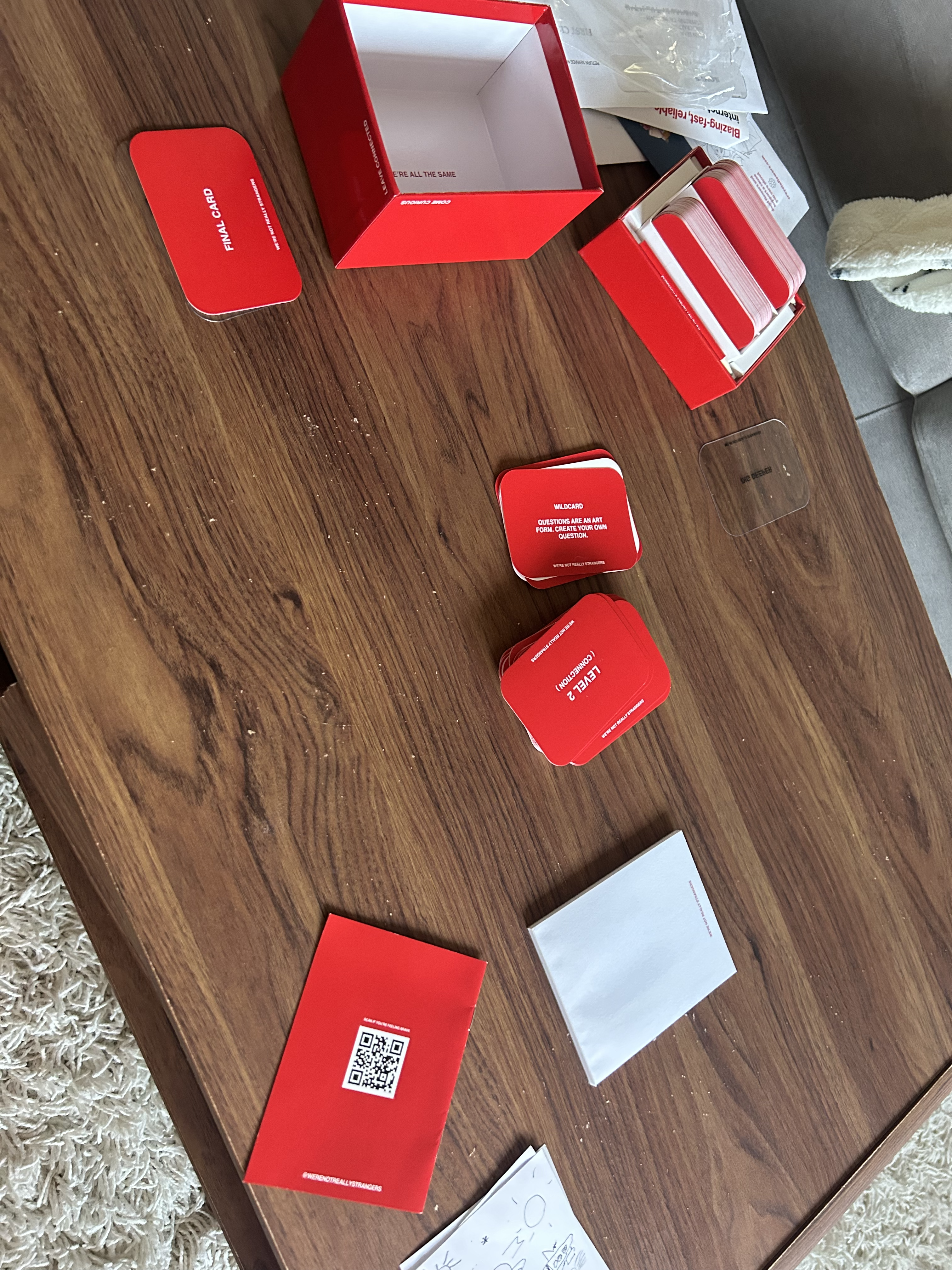This week, I played We’re Not Really Strangers (WNRS), a getting to know you game created by Koreen Odiney. It can be played by larger groups of people, but is ideal for two people that want to deepen their relationship. I found that WNRS rewarded deep levels of vulnerability through designing for a mutual, gradual increase in intimacy and the designation of the themed levels.
I played WNRS with my friend Angel, who I met through a mutual friend. Because of this, I haven’t had many opportunities to talk to him one-on-one. I have wanted to get to know him better for a long time, and I had the sense we could be really great friends, so I was very excited to play it with him. I thought it could be, as advertised by Vogue, a “shortcut to intimacy.”
WNRS has 3 levels, and each player should go back and forth asking the questions on the cards, starting at Level 1. After 15 cards at each level, players should move on to the next. The levels are themed: Level 1 is perception, Level 2 is connection, and Level 3 is reflection.
The game begins by easing players in, allowing players to become comfortable talking about themselves and the other player. The first level asks impression questions, with players answering questions about the other player. In the beginning, both Angel and I were a little hesitant. The first question was to “make an assumption about the other player.” We both gave very surface-level assumptions, along with some uncomfortable and nervous laughter. Though our answers to this question didn’t say much about ourselves, it allowed for both Angel and I to talk about the other person in a low-stakes situation. We also discussed the accuracy of the assumptions, giving us an opportunity to talk about ourselves.
Another level 1 card had us draw pictures of each other in a minute. The pictures we drew were pretty bad and really funny, which also helped break the ice. We also had to co-create a drawing, a mechanic that brought about an aesthetic of collaboration and creativity. Though the level 1 questions did not demand explicit vulnerability, they gave us the opportunity to loosen up, setting the stage for increased intimacy in the second level.
Because of the back-and-forth nature of the questions and answers, the game is able to encourage mutual vulnerability. The second level, connection, has far more explicitly vulnerable questions, with cards like “who was the first person you fell in love with, and why did you fall in love with them?”. The second level also asks players questions about themselves, rather than questions about the other. Because Angel and I were able to ping-pong our question cards back and forth, I noticed that when I was more vulnerable, Angel became more vulnerable, and vice-versa. I realized that if I wanted Angel to open up I would also have to open up, and WNRS is extremely well-designed for this mutual vulnerability, as the questions became more probing and we gradually revealed more and more about ourselves. We also asked each other several follow-up questions, and sometimes our discussion of each question would go on for up to half an hour. The concept of “opt-in intimacy” applies very aptly to WNRS, as players can choose to answer the questions however they wish, but you are rewarded for vulnerability because you will learn more about the other player, and deepen your relationship.
With the third level, players go back to answering questions about the other. However, with the shared context of the previous two levels and all of the past questions, Angel and I were able to be far more thoughtful with one another about our answers, and even though the questions are structured similarly to the first level, our answers were far more intimate. Some questions, like “What would be the perfect gift for me?” felt like they would have fit better in the first level, but others, like “What do you think our most important similarities are?” forced us to think back on what we had learned about each other over the course of the game, and our relationship as a whole.
Angel and I also wrote notes to each other, since the final card of WNRS has players do so. I realized that I was very honest with Angel, expressing how much I respected him and enjoyed his company, and how grateful I was for our friendship. He was similarly vulnerable, thoughtful, and open in his own note. WNRS was extremely successful at its stated goal – to create an environment emphasizing shared vulnerability and mutual intimacy through a gradual increase in openness through its mechanics of question and answer and the progression of levels.



